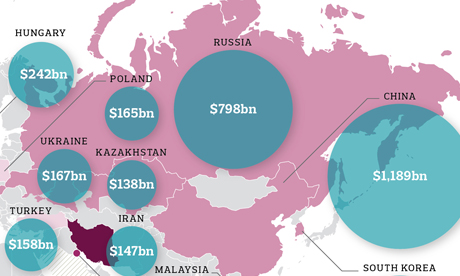Countrywide whistleblower reveals rampant mortgage fraud part of ‘everyday business’By Sarah Jaffe, AlterNet | Saturday, July 21, 2012 0:01 EDT
Countrywide Financial was one of the subprime lenders at the heart of the financial crisis; its predatory lending practices resulted in disgustingly large payouts for executives while sticking low-income borrowers with explosive mortgages they hadn’t a hope of paying back. The
New York Times‘ Gretchen Morgenson called Countrywide, “Exhibit A for the lax and, until recently, highly lucrative lending that has turned a once-hot business ice cold and has touched off a housing crisis of historic proportions.”
Eileen Foster was an investigator in charge of Fraud Risk Management at Countrywide when the ticking time bomb of its bad loans detonated. The practices she discovered shocked her and have also shocked those who’ve heard her story—including the producers of “60 Minutes,” who asked her on the program last December to discuss the lack of prosecutions of any of the bankers responsible for the crisis. But instead of cleaning house and admitting guilt, Bank of America—which purchased Countrywide as the financial crisis grew, in what the
Wall Street Journal calls “one of the worst deals ever struck in corporate America”–drove Foster out and tried to discredit her findings.
In 2011, the Department of Labor ruled that Foster had been illegally fired. It said that her firing was retaliation for her whistle-blowing and ordered that she be reinstated and paid compensation. There have still been no prosecutions, and no officials have asked to hear Foster’s story—so she’s taking it public. Earlier this year, she was honored with a
Ridenhour prize for truth-telling from the Nation Institute and the Fertel Foundation, and this week she spoke with AlterNet in an exclusive interview discussing what she saw at Countrywide—and what happened to her as a result.
“
Rampant Fraud”“This is a mountain that people think is a molehill,” Foster told AlterNet. “As far as this type of financial crime, things are far worse than I would have ever imagined. In my furthest imagination I would have been challenged to come up with the things I have seen play out.”
Foster applied for the job as the head of the internal investigations department after 18 months at Countrywide’s corporate office. When she got in, in March 2007 she found a department in disarray, with multiple divisions responsible for investigation and little oversight—or worse, investigators reporting to the salespeople they were investigating. “That created quite a conflict, a general inability to do an effective job,” she said.
Despite the disarray, at first she was hopeful—the department had been working on a “fraud reengineering plan” that was supposed to reorganize investigations and provide better oversight. Yet that feeling didn’t last. “Hair did start to stand up on the back of my neck when the reengineering plan was finalized on March 31,” she said. Before accepting her new position, she had not been aware she’d be expected to sell the new plan to the company executives—but one of the first things on her agenda was to get executives in each division to agree that there should be a single group that did investigations, with investigators reporting to Foster instead of to them. She said, “I kind of wondered, is this just a sham?”
Executives, somewhat predictably, were less than thrilled with the idea of more oversight, and the plan wound up being shelved. At about the same time, Foster got a call on her internal fraud hotline from a former employee of Countrywide’s subprime division, Full Spectrum Lending (or FSL for short). This former employee described rampant fraud in FSL’s Boston division.
“Normally this would be something that would get handed off to the fraud control unit in FSL,” Foster said. “It didn’t feel right to hand off something of that level. One of the comments was ‘This has been going on for years, nothing’s ever done.’”
And perhaps nothing would have been done, but, Foster said, her counterpart in the fraud control unit within FSL was on vacation. “That made it pretty easy for me to step into a leadership role, take over and call the shots on how the investigation was going to be conducted.” And as the investigation went on, all the allegations the tipster made were vetting out.
A team of investigators went to Boston to look into the complaints in person and were shocked by what they found. “Typically when you’re looking for fraud you’ve got to really look because one of the primary components of a fraud is concealment,” Foster said. “These people weren’t concealing it. They were concealing it from corporate, but every person who walked into those branches every day was a participant.”
“One process was to cut a signature off one document, paste it and make a photocopy so it looks like an original signature,” she continued. “A part and parcel of everyday business was to do anything it took to fund a loan.”
They had templates for fabricating documents, cases of Wite-Out for changing names and a method for gaming the automated underwriting system—plugging in income values until they got one that worked and allowed them to underwrite the loan. They’d keep a template bank statement from each bank, then plug in different borrowers’ names and an asset amount to prove that the borrower could make the payments on the loan.
The
Department of Labor report that vindicated Foster described “multiple incidents of egregious fraud spread throughout the entire region, including loan document forgery and alteration, manipulation of borrower’s assets and income, manipulation of the company’s automated underwriting system, the destruction of valid client documents, and evidence that blank templates of bank statements from several different financial institutions were emailed back and forth among loan officers in various branches for use in forging proof of borrower income and assets.”
“I initially was thinking, ‘God this is a big problem,’ it’s not one little thing where you send an email out and it fixes it,” Foster said. “I recognized it as a huge problem but in my mind I was questioning if this was why they put together this fraud reengineering plan.”
Investigating the InvestigatorsForty-five days into Foster’s investigation, she got a phone call from the president of the FSL division. “He just went on a rant on the phone,” she said, saying he was “sick and tired of these witch hunts” and demanding to know what she was doing. (Greg Lumsden, the executive in question, told
iWatch News that he didn’t remember Foster or the phone call.)
Foster, meanwhile, was trying her best to come up with reasonable explanations for the things she’d seen. “In order to know that what you’re seeing is what you believe you’re seeing, you have to play devil’s advocate with yourself,” she said. But in this case, the fraud was undeniable—Countrywide wound up closing six of its eight branches in that region and firing around 44 people because of what she’d found.
To some degree, the pushback didn’t really surprise her. “Most places that I’ve worked for the past 25 years there’s always been the sales people and the fraud people, really on two different sides of the spectrum,” she explained. “They say that we’re loan prevention. Their goal is to get as many loans funded as they can and in their mind our goal is to stop the loans from funding. Neither side can go crazy but what clearly happened here was this side was going crazy, their goal seemed to be to eliminate any interference with their revenue, bonuses and commissions.”
Foster moved to try to get the fraud reengineering plan, which had been shelved after intense pushback within the company, reinstated so that she could conduct a more thorough investigation. When the company decided to conduct an internal audit, she took that opportunity to tell auditors her suspicions about the rest of the subprime department. She’d found so much wrongdoing in the Boston division, she had a hard time believing that the few referrals she was getting each month were the only incidents happening across the company. “It seemed like there were two incidents of fraud taking place every five minutes in that Boston region,” she pointed out.
But the audit report was a disappointment. “The audit said that FSL has a reporting problem and they should prepare an action report,” she said. “Anybody reading it would’ve thought they said they needed to vacuum the carpets. It was just made to look like a total nonevent instead of the serious issue that it was.”
It was at this point that Foster started to wonder how much other executives within Countrywide actually knew and were covering up. “I stopped looking at some other executives as victims and considered whether they were actively colluding, or were the architects of the problem. That became very daunting.”
Things got even worse when, in 2008, Foster received a complaint from a Nashville, Tennessee consumer markets division branch—prime lending, not subprime. “It was a pretty shocking thing to read,” she said, with employees saying that the manager of that branch was out of control, that they’d been complaining for years and nothing had happened. “Essentially it contained the same allegations as did the branches in Boston.” (The
Department of Labor report indicates “forgery, alteration and destruction of documents, loan manipulation, knowing submission of false documents, and conspiracy with outside business partners to obtain loans for their businesses.”)
Foster was also running into problems with Countrywide’s Employee Relations department, which, according to the DOL findings, did not address complaints of retaliation against whistleblowers and compromised the anonymity of those who tried to report misconduct. Employee Relations was getting in between Foster and her investigations and interfering with the mechanisms in place at Countrywide for anonymous reporting of fraud. Foster noted, “There was very little that was anonymous at Countrywide, it was sometimes too easily used to identify the people and get rid of them.”
At the same time these internal investigations were going on, the broader mortgage market was melting down. By January 2008, when Bank of America reached a deal to buy the sinking Countrywide, it had lost some $1.6 billion over the previous six months. Bank of America may have thought it was getting a good deal—the original price was
$2.5 billion—though it wound up costing, in one estimate, about
$30 billion when the cost of legal settlements and mortgage writedowns was factored in.
But at the time, at Countrywide, Foster looked forward to Bank of America coming in. “I thought, the people who are doing what they are not supposed to be doing, they can be controlled now.” She applied for a promotion at Bank of America, which only had a few mortgage fraud investigators.
At the same time, she continued to press Countrywide about its problems, going to the managing director of the internal audit department—which reports separately to the president of the company—with her allegations. Instead of looking into her reports, they authorized an investigation of Foster herself. “They did not ask me the details,” Foster said. “This was a notifications email; what should have happened is an investigative team should be assigned and at that point I would share the information that I had collected. Instead they tried to find a reason to get rid of me.”
According to the DOL report, somewhere around April 14, 2008, Employee Relations began questioning Foster’s employees about her conduct—sometimes grilling them for hours. The DOL also noted that Foster’s own boss, Mark Miller, questioned the reasons for ER’s investigation. His concerns grew as the investigation progressed.
In July, meanwhile, the deal with Bank of America was finalized and Countrywide was dissolved into the larger bank. Foster was given a promotion, after a long vetting process, to senior vice president, Mortgage Fraud Investigations Division Executive. And one of the first things BofA did was dissolve the whole subprime division. “It would’ve been exhausting to try to change that culture,” Foster noted. Instead, she thought that Bank of America was sweeping out the old and bringing in the new—and she still had hopes for her new position.
That didn’t last. “Bank of America essentially just jumped on board and tried to shut me up,” she said. In September, she was scheduled to talk to federal regulators from the Office of the Comptroller of the Currency—but she ended up fired instead. “It was on September 2nd they told me I was going to be talking to regulators. It was on September 5th that I refused to be scripted and by September 8th I was fired,” she said. “They handed me a 14-page document saying ‘We don’t think you’re right for this role, if you sign this and don’t talk about it we’ll give you $228,000 and you can be on your merry way.’ I wouldn’t even look at it.
“Their misguided hope was thinking I would take the money.”
Corruption and ConsequencesThe Department of Labor found that Foster was “a high-performing employee with no history of poor performance or conduct issues,” and ordered Bank of America to pay her back wages, interest and to reinstate her. But that fight took three years and the bank still doesn’t want to make it right. For two of those years, Foster was unemployed.
Meanwhile, the executives at Countrywide and Bank of America have faced few consequences. In 2010, Angelo Mozilo, the co-founder of the company, agreed to
pay $67.5 million to the Securities and Exchange Commission to settle fraud charges against him, but no one’s gone to jail. “Who’s suffering the consequences? The good guys are the only consequences? Your bad guys suffer no consequences so that’s why they keep doing it,” Foster said. “I can’t say I knew I was going to lose my job. I thought I was going to get a pat on the back from Bank of America.”
When asked about the extent to which fraud permeated Countrywide’s corporate culture, Foster said there was a core group of people who were willing to do anything. “I don’t know if it was people with just a poor sense of morals, people who were being extorted, people who were being intimidated, coerced, threatened, but there were go-to people. They were either relatively smart or this core of people who protected it was even much larger than I can accept to believe today.”Yet years later, we still find ourselves debating who’s at fault for the mortgage crisis, with all too many people still attempting to place the blame on the backs of borrowers who bought houses they couldn’t afford. Foster doesn’t buy that, not after what she saw. Without borrowers knowing, she noted, their documents were changed, their signatures cut and pasted onto things they’d never seen, their incomes magically multiplied. “They’d set them up with those teaser rates they could afford, put in the income they needed,” she said. “They were so confident that they could refinance, they could sell it, because property values were going up. That’s how some of the loan officers rationalized it. Another part of fraud is rationalizing what you’re doing.”
The motivation for churning those loans out was the secondary market, where the loans were repackaged and sold to investors—and Foster said the fraudulent loans hit the market just like any other. One of her investigators, in June 2008, received an email from the secondary markets division asking him to remove the flag they’d placed on certain loans so that he could pool them for sale. “I called him up and said, ‘Do you understand what this flag is?’ He was just focused on needing these 27 loans for this sale.”
Foster said that none of the loans from a division that had had six branches shut down for fraud should’ve been securitized or pooled for sale without prior re-examination. “With all of these investigations, when we found a branch or a loan officer or whomever who just had too many delinquencies due to fraud, those loans should’ve been flagged that they couldn’t without further due diligence be securitized, they couldn’t be sold, they couldn’t be transferred to an investor. Because that would’ve been the only thing that could’ve forced Countrywide to change their ways: if they’d been forced to absorb the losses from these loans. But they just passed them on, and nobody was adequately checking up on them.”
And yet regulators and government officials continue to claim that they haven’t found any crimes they can prosecute bankers for. Foster doesn’t buy that either. “There’s a lot of crime going on in these cases. Some people have made false or misleading statements to the federal investigators investigating my case, and there’s absolutely no consequence as a result.”In the meantime, Foster noted, the banks are simply too powerful and their hold on politicians too strong. Just this month, a
House of Representatives report showed that Countrywide “made hundreds of discount loans to buy influence with members of Congress, congressional staff, top government officials and executives of troubled mortgage giant Fannie Mae.” Those members of Congress included former Senate Banking Committee Chris Dodd (D-CT), Senator Kent Conrad (D-ND), Rep. Elton Gallegly (R-CA), and Rep. Howard “Buck” McKeon (R-CA).
“Even if you want to do the right thing, you can’t ignore realities. When you see somebody who goes up against the giant and gets squashed you’re not going to run under the next bootstep,” Foster said. “The only way that you get society to abide by certain rules, there has to be some sort of consequences that outweigh the benefit.”







